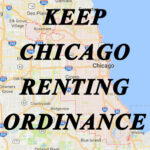 Post-Foreclosure Landlords Beware
Post-Foreclosure Landlords Beware
The relatively new Keep Chicago Renting Ordinance (KCRO) was the subject of an appellate case, Wells Fargo Bank v. Volneat Vanette McCondichie, released on March 31, 2017. Readers will recall that the ordinance requires the first party that takes over a post-foreclosure property, under most circumstances, to either allow the tenants to continue with their lease or to pay a relocation fee of $10,600 to the tenants who vacate.
Briefly, Wells Fargo became the owner of a property in July, 2014 by way of a judicial sale arising out of a foreclosure. In July, 2015, Wells Fargo filed an eviction action against the defendant in the case. In the eviction, the Defendant alleged that she resided in the property as a “qualified tenant” as defined in the KCRO pursuant to a valid lease and was thus entitled to the relocation assistance and the bank should be stopped from obtaining an order for possession in the eviction. In response, the bank filed a motion for summary judgment arguing that “it had a superior right to possession pursuant to the order approving the judicial sale and the underlying deed” and the defendant produced a lease from January, 2012 that converted into a month to month lease and that a new lease was signed in September, 2014 (after Wells became owner in July, 2014). The bank argued that the July 23, 2014 foreclosure cut off the former owner’s property rights, so the September, 2014 lease was invalid. The circuit court agreed and entered an order for possession against the tenant. The tenant appealed.
The tenant first contended that the month to month lease is enough to be a bona fide tenant. Wells argued that the ordinance does not provide an affirmative defense to a forcible entry and detainer action. The court agreed with the tenant that the ordinance does present a defense against an eviction action. The appellate court further agreed that it was possible that a material issue of fact exists as to whether or not the tenant’s rental agreement was bon fide or not. The court agreed that the case should not have been decided via summary judgment and reversed the lower court, ordering further proceedings.
So, what further implications does this have? For those landlords who acquire their properties from a foreclosure sale, it certainly signifies the reality of the requirements of the KCR Ordinance. Landlords subject to the KCRO need to understand their obligations and need to comply as failure to do so can lead to massive penalties.
